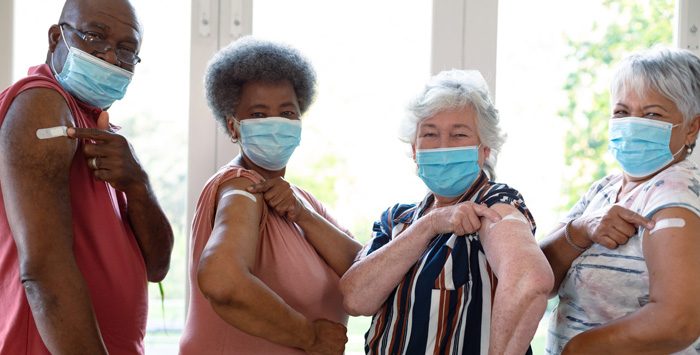Does Medicare cover the cost of the shingles vaccine?
Yes. Starting in 2023, millions of Americans enrolled in Medicare Part D prescription drug coverage are paying no longer had to pay out-of-pocket costs for a list of adult vaccines – including the shingles vaccine.
The change is the result of the Inflation Reduction Act, which eliminated out-of-pocket costs for vaccines recommended by the Advisory Committee on Immunization Practices (ACIP).
This improved shingles coverage is a welcome addition to Original Medicare’s coverage of vaccinations for COVID, flu, hepatitis B and pneumonia.
How does Medicare cover vaccinations?
Enrollees with Part D coverage – either through a stand-alone Part D plan or a Medicare Advantage prescription drug plan (MAPD) – have coverage of commercially available vaccines. These include the shingles vaccine, Tdap vaccine, and other vaccines recommended by the ACIP.
Before 2023, Medicare enrollees with Part B coverage already had coverage of four common vaccinations – influenza, pneumonia, Hepatitis B and COVID-19. Part B also covers shots that are necessary when an enrollee is accidentally exposed to a harmful virus or bacteria.
Are shingles shots free under Medicare?
According to GSK, the makers of the shingles vaccine Shingrix, Medicare beneficiaries paid $50 or less per dose (less than $100 for the 2-dose series) in 2022. But as of January 1, 2023, those costs decreased to $0 for people who had a Medicare Part D plan.
This means that Medicare enrollees will not have to pay a deductible, copay, or coinsurance to get the shingles shot. This applies to the cost of the vaccine itself, any dispensing fees, and any fees to administer the vaccine. The vaccine will be free whether a beneficiary is enrolled in a stand-alone Part D plan or a Medicare Advantage plan with drug coverage included.
However, it is possible an enrollee could be asked to pay a fee up front and then be reimbursed by their Part D or Medicare Advantage plan later. This may occur if the healthcare provider administering the vaccine or if a retail pharmacy is not in an enrollee’s plan network.
What is shingles?
Shingles is a painful blistering rash that affects as many as 1 in 3 people at some point in their lifetime. The condition is caused by the same virus that causes chicken pox, a virus known as varicella-herpes zoster.
If you contract shingles, it tends to occur on one side of your face or body, following the path of one of your nerves.
In many cases, the shingles rash scabs over within 7 to 10 days (you are considered contagious until then) and goes away within a month. However, as many as 8% of people will develop a painful syndrome, known as postherpetic neuralgia, that can last months or years.
Who gets shingles?
After you get chicken pox, the virus continues to live in your body but is dormant (inactive), meaning that it does not cause symptoms. It is estimated that more than 99% of Americans born on or before 1980 have had chickenpox and are at risk for shingles.
Shingles occurs when the virus is reactivated. This can occur when your body is stressed or your immune system is weakened. Immunosuppression can happen when you are being treated for cancer, have HIV, had an organ transplant, or are on immunosuppressive therapies (including chronic steroids) for conditions like inflammatory bowel disease, rheumatoid arthritis, or psoriasis. Please know that this is not an all-inclusive list.
It is also important to realize that you can get shingles when you are healthy. That’s because the immune system gradually weakens as you get older. The rate for shingles increases significantly after the age of 50. One study even showed that postherpetic neuralgia was 15 times more common in people 50 years or older when compared to those who were younger.
Does Medicare cover Shingrix?
Today, there is currently only one commercially available shingles vaccine in the United States – Shingrix. Unlike prior vaccines, such as Zostavax, Shingrix is not derived from a live virus. Instead, it is a recombinant vaccine that uses inactive parts of the virus to teach your immune system how to fight off varicella-zoster.
Shingrix is 90% effective in preventing shingles and post-herpetic neuralgia. It is currently recommended for people 50 and older and is administered as a two-dose series. The second dose is given two to six months after the first. Medicare covers the cost of both doses of the vaccine series.
Do I need the Shingrix vaccine if I got the Zostavax vaccine?
The Zostavax vaccine was first available in 2006 but is no longer available in the United States. If you received the Zostavax shingles vaccine before 2020, it is still recommended that you get the Shingrix vaccine. That’s because data shows that Shingrix is considerably more effective than Zostavax was when it comes to preventing shingles outbreaks, 90% vs. 51%, and preventing postherpetic neuralgia, 90% vs. 67%.
Will Medicare pay for the shingles vaccine if I had shingles previously?
Yes. Medicare will cover the shingles vaccine even if you have had shingles previously. The unfortunate truth is that you can get shingles more than once. Because the virus lives inside you, you can have an outbreak at any time. In fact, data shows that shingles recurrences happen in up to 10% of those who’ve already had shingles.
The risk for another outbreak increases the older you get. It also increases depending on the severity of your first case of shingles and whether or not you had nerve-related pain from shingles that lasted 30 days or more.
Tanya Feke, M.D. is a licensed, board-certified family physician living in New Hampshire. As a practicing primary care physician in Connecticut and an urgent care physician in New Hampshire, she saw first-hand how Medicare impacted her patients. In recent years, her career path has shifted to consultant work with a focus on utilization review and medical necessity compliance.
Dr. Feke is an expert in the field, having Medicare experience on the frontlines with both patients and hospital systems. To educate the public about ongoing issues with the program, she authored Medicare Essentials: A Physician Insider Reveals the Fine Print. Her analysis of Medicare issues is frequently referenced by the media and she is a contributor to multiple online publications. As founder of Diagnosis Life, LLC, she also posts regular content about health and wellness to her site at diagnosislife.com.
Footnotes
Tags: shingles, vaccinations





